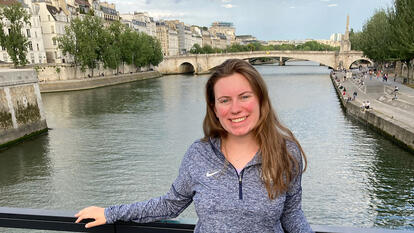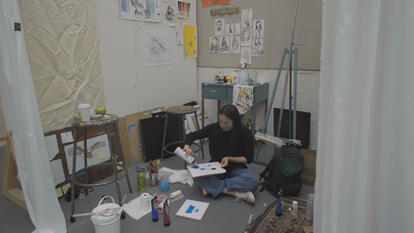Wellesley Award Recognizes Exceptional Teaching in Music, Political Science, and Astronomy

Each year the Anna and Samuel Pinanski Teaching Prize honors members of the faculty who have demonstrated excellence as teachers. The finalists are selected by a student-faculty committee on the basis of nominations from students, faculty, and staff.
“When we consider how Wellesley professors routinely and effortlessly innovate and inspire in their classrooms, to be selected for this prize must be seen as an especially outstanding achievement,” said President Paula Johnson when announcing this year’s recipients during commencement exercises on June 1. She then read a citation for each of the honorees; below are excerpts.
Wesley Andrés Watters, astronomy
Professor Wesley Watters’ impact on his students is, quite literally, out of this world. The Diana Chapman Walsh Assistant Professor of Astronomy, Professor Watters, who recently received tenure, not only teaches the science of rockets and how to investigate the slopes of sand dune faces on Mars, he teaches resilience and perseverance in the face of challenge; teamwork; and how to “recognize the breadth of my capabilities” and find “the courage within myself to reach beyond those highest glass ceilings,” in the words of one student.
In courses that include Planetary Atmospheres and Climates and Hands-On Planetary Exploration, Professor Watters also teaches his students one of the most valuable skills for scientists and engineers: how to overcome unforeseen problems.
His students learn to work together as a team in project-based courses, such as one in which they must build a craft capable of making scientific observations as it explores Earth. Students praise his talent for “forming cohesive groups capable of taking on what are possibly the most complex and rigorous engineering challenges available at Wellesley.”
Professor Watters gives every student the knowledge and skills she needs to succeed as well as the confidence to believe in her own ideas. He works alongside his students, co-authoring major papers with them and preparing them to take on any challenge, from researching Martian meteorite impact craters to landing internships at places like NASA’s Jet Propulsion Laboratory.
For his masterful way of widening science and engineering to encompass a world of other skills, it is an honor to present Wesley Watters with the Anna and Samuel Pinanski Teaching Prize.
Paul MacDonald, political science
When students take even a single course with Paul MacDonald, associate professor of political science, they make a host of discoveries—they see new academic paths open in front of them, learn the keys to critical thinking, and gain insights into our increasingly complex world.
Professor MacDonald’s course topics range from leadership, to military strategy, to empires and imperialism, but, according to students, they share a common result. His classes, they say, make them better thinkers and communicators, stronger logicians and debaters, and more savvy “consumers of information.” He “deftly clarifies complex theories and concepts while encouraging [us] to think critically and ask [our] own questions,” said one student. “When I read for his and other classes,” she added, “I…hear his voice in my head, asking, ‘What’s the logic here? What’s the counterargument?’”
Through a rich and rigorous study of political science, Professor MacDonald’s courses engage students with the world. Professor MacDonald inspires students to pursue a career path that sorely needs more women in its ranks.
For his ability to shape the keenest of thinkers and for his role in encouraging women to envision successful futures in political science and international affairs, it is an honor to present Paul MacDonald with the Anna and Samuel Pinanski Teaching Prize.
Jenny Johnson, associate professor of music, combines her expansive knowledge of 20th-century music and 21st-century technology with a dedication to opening up new vistas of creative expression for every student.
For Professor Johnson, the classroom and performance space are places for students to challenge not only themselves but also the assumptions and pre-existing narratives of their fields. Professor Johnson widens and deepens the study of 20th-century music to include women and people of color.
A cutting-edge composer, sound artist, and music scholar, she persuades students to reconsider what music and art can be and to “dismantle traditionalist music concepts ingrained into us.” In her teaching, Professor Johnson reaches well beyond the classroom to ensure that her students, no matter their technical background, have the tools, knowledge, and encouragement to pursue the projects they most care about.
But she is perhaps most gifted at finding ways to tap into the powerful creative forces that lie within her students, to help them create the music that tells their individual stories.
For her ability to give every student the knowledge, tools, and support she needs to unleash her creative potential, it is an honor to present Jenny Johnson with the Anna and Samuel Pinanski Teaching Prize.



